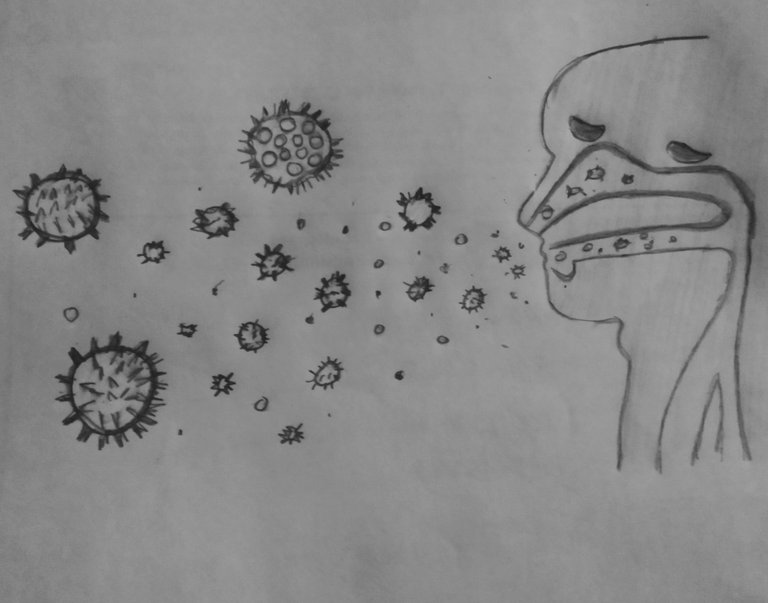Rinitis Alérgica, una consulta frecuente.

Saludos apreciada comunidad, esperando en Dios que tengan salud y bienestar, además de buena energías para afrontar la vida de forma óptima.
Hoy escribiré sobre Rinitis Alérgica.
Una de las visitas más frecuentes que recibo en mi consultorio médico,tienen como objeto tratar esta patología, la cual incide de forma negativa en la calidad de vida de las personas.
La rinitis alergica, consiste en un transtorno inflamatorio en la mucosa nasal ( a diferencia de la sinusitis que es la inflamación de los senos paranasales), sin importar su origen patogénico.
Esta inflamación es una sintomatología basada específicamente en estornudos frecuentes que se acompañan con dificultad leve al respirar y un picor constante en la nariz que resulta incómodo a quien lo padece, obligando al paciente a respirar por la cavidad bucal.
Es importante mencionar que a nivel mundial, la rinitis alérgica es considerada como un mal muy frecuente y puede presentarse en cuadros repetidos si el individuo hace contacto habitual con el agente causal.
Es oportuno señalar que la presencia de la rinitis alérgica, se debe a diversos factores entre los cuales pueden estar implícitos los factores genéticos que sin duda puede representar que el individuo tenga mayor predisposición a desarrollar esta condición, así como también los factores ambientales e incluso una combinación entre ambos.
Se puede de igual manera decir que la Rinitis Alérgica es un padecimiento subestimado por médicos y pacientes. Desde mi experiencia puedo asegurar de primera mano que quien la sufre puede afectar negativamente el animo, incluso puede desgastar al individuo mentalmente influyendo en su vida social, laboral o escolar.
Pero, ¿Por qué se produce la Rinitis Alérgica?
Básicamente es una respuesta inmunitaria frente a alérgeno como el polen, el polvo, el pelo, los olores fuertes (químicos), el humo, e inclusive los cambios climáticos. Este tiene dos etapas, la de sensibilización mediado por los anticuerpos IGE, y la fase clínica: dónde se manifiestan los síntomas.

Diagnóstico:
El diagnóstico debe hacerse con una exploración clínica y un interrogatorio detallado y profundo, valorando el estado del paciente, los signos y síntomas presentados y su duración.
Y en casos muy graves o repetitivos podría ser necesaria una Rinoscopia Anterior, para determinar posibles daños y soluciones de la rinitis alérgica.
Tratamiento:
A menudo se indican Antihistamínicos (loratadina, difenhidramina, azelastina ect) en conjunto con medidas higiénico-sanitarias que incluyen mantener las fosas nasales limpias, las manos, y el medio ambiente en donde se desenvuelve el individuo óptimo, sin polen, ni polvo, ni productos de algodón, además se recomienda mantenerse alejados de tala, quema y evitar el contacto con productos químicos.
En casos más serios inclusive se puede mandar corticoides. Lo ideal es asistir al centro de salud más cercano y que sea el médico encargado de indicar el debido tratamiento.
En estos tiempos donde el Covid-19 y sus diferentes variantes están presentes en nuestra cotidianidad es importante y necesario saber diferenciar todas y cada una de las patologías que pueden llegar a comprometer nuestro sistema respiratorio.
Grácias.
Dios siempre de Cabrestero.
PD: Foto y dibujo de mi propiedad.
Greetings dear community, hoping in God that you have health and well-being, as well as good energy to face life optimally.
Today I will write about Allergic rhinitis.
One of the most frequent visits I receive in my medical office is to treat this pathology, which has a negative impact on people's quality of life.
Allergic rhinitis consists of an inflammatory disorder in the nasal mucosa (as opposed to sinusitis, which is the inflammation of the paranasal sinuses), regardless of its pathogenic origin.
This inflammation is a symptomatology based specifically on frequent sneezing that is accompanied by mild difficulty breathing and a constant itching in the nose that is uncomfortable for those who suffer from it, forcing the patient to breathe through the oral cavity.
It is important to mention that, worldwide, allergic rhinitis is considered a very common disease and can occur in repeated cases if the individual has regular contact with the causal agent.
It is appropriate to point out that the presence of allergic rhinitis is due to various factors, among which genetic factors may be implicit, which undoubtedly may represent that the individual has a greater predisposition to develop this condition, as well as environmental factors and even a combination between both.
It can also be said that allergic rhinitis is an underestimated condition by doctors and patients. From my experience I can assure you first-hand that those who suffer from it can negatively affect their mood, it can even wear the individual down mentally, influencing their social, work or school life.
But, why does allergic rhinitis occur?
Basically it is an immune response against allergens such as pollen, dust, hair, strong odors (chemicals), smoke, and even weather changes. This has two stages, that of sensitization mediated by IGE antibodies, and the clinical phase: where the symptoms manifest.
Diagnosis:
The diagnosis must be made with a clinical examination and a detailed and in-depth questioning, assessing the patient's condition, the signs and symptoms presented and their duration.
And in very severe or repetitive cases, an Anterior Rhinoscopy may be necessary to determine possible damage and solutions to allergic rhinitis.
Treatment:
Antihistamines (loratadine, diphenhydramine, azelastine, etc.) are often indicated in conjunction with hygienic-sanitary measures that include keeping the nostrils clean, the hands, and the environment in which the optimal individual develops, without pollen, dust, or cotton products, it is further recommended to stay away from slashing, burning and avoid contact with chemicals.
In more serious cases, corticosteroids can even be sent. The ideal is to go to the nearest health center and have it be the doctor in charge of indicating the proper treatment.
In these times where Covid-19 and its different variants are present in our daily lives, it is important and necessary to know how to differentiate each and every one of the pathologies that can compromise our respiratory system.
Thank you.
Gracias por este post Doc. Yo toda mi vida he sufrido de rinitis, pensé que era porque mi mamá fuma y vivía con ella, pero ahora me mudé y sigo, incluso si voy a sitios más limpios, respiro mejor pero no al 100% y si es caótico e incómodo despertar todos los días así y ni hablar de la sensibilidad. Dentro de poco me haré una prueba de alergias, espero allí encuentre la respuesta 😔
Congratulations @arturocajoti86! You have completed the following achievement on the Hive blockchain and have been rewarded with new badge(s):
Your next target is to reach 80 posts.
You can view your badges on your board and compare yourself to others in the Ranking
If you no longer want to receive notifications, reply to this comment with the word
STOPTo support your work, I also upvoted your post!
Check out the last post from @hivebuzz:
Support the HiveBuzz project. Vote for our proposal!
Su post ha sido valorado por @ramonycajal